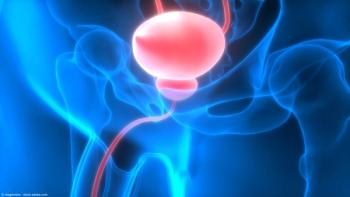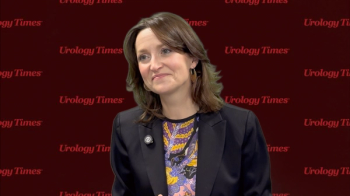
Bladder Cancer
Latest News
Latest Videos

Shorts






CME Content
More News

INVITE is a 2-part clinical trial designed to evaluate the safety, feasibility, and patient experience of administering intravesical bladder cancer therapies in the home.

Health care providers and allied health care professionals described insertion and removal of the system as “straightforward” and done in less than 5 minutes.

At a median follow-up of 25.8 months, the CR rate at any time was 75.5%.

At a median follow-up of 18.8 months, the confirmed ORR was 31%.

Félix Guerrero-Ramos, MD, PhD, FEBU, discusses key findings from the phase 3 POTOMAC trial and other studies of BCG/ICI combinations in high-risk NMIBC.

A recap of the FDA submissions and regulatory decisions in urology from November 2025.

At the 2025 LUGPA Annual Meeting, Joshua J. Meeks, MD, PhD, outlined the rapidly evolving treatment landscape in MIBC.

Schmidt notes that differences in response rates between disease subtypes largely reflect inherent tumor biology.

The data, presented at ESMO, support a role for gemcitabine intravesical system plus cetrelimab in MIBC.

The authors suggested that a greater treatment effect may be observed with a more antigenic vaccine.

AVZO-103 is a Nectin-4/TROP2 biospecific antibody-drug conjugate for adult patients with urothelial carcinoma whose tumors have progressed on enfortumab vedotin.

A key finding was that 86% of patients required no additional therapy after receiving nadofaragene.

The approval is supported by results from the phase 3 KEYNOTE-905/EV-303 trial.

Notably, 81% of patients said that they were interested in trying new or different treatment options.

One particularly striking finding from KEYNOTE-905/EV-303 is the nearly 60% pathologic complete response rate.

The CxBladder Triage Plus Test identifies patients with hematuria who are at higher risk for urothelial carcinoma.

Joshua J. Meeks, MD, PhD, highlights that collaboration between urologists and medical oncologists has become essential.

John Eifler, MD, highlights new real-world evidence on nadofaragene firadenovec-vncg for BCG-unresponsive NMIBC.

Suzanne B. Merrill, MD, FACS, discussed the feasibility of integrating immune checkpoint inhibitors into clinical practice for NMIBC, particularly in the community setting.

Safety outcomes were favorable: cystectomy-free survival was 94%, overall survival was 100%, and only 1 patient progressed to muscle-invasive disease.

Mobley also shares her treatment approach to BPH and explains the challenges of treating OAB.

"I'm very excited to bring this therapy to our patients in the Philadelphia area and to be able to offer it at MidLantic," says David Cahn, DO, MBS, FACOS.

"For me and the patients, [nadofaragene firadenovec is] a very convenient dosing schedule, and it's a very efficacious treatment," says Ravi D. Chauhan, MD, FACS.

Looking forward, Meeks said he sees nadofaragene firadenovec as a promising addition to the NMIBC treatment landscape.

Suzanne Merrill, MD, outlines recent progress with immunotherapy across NMIBC and MIBC.















